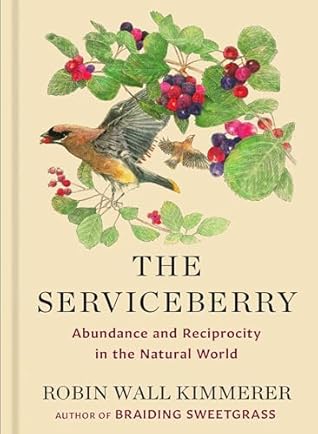More on this book
Community
Kindle Notes & Highlights
Read between
December 9, 2024 - January 10, 2025
Enumerating the gifts you’ve received creates a sense of abundance, the knowing that you already have what you need. Recognizing “enoughness” is a radical act in an economy that is always urging us to consume more.
Ecopsychologists have shown that the practice of gratitude puts brakes on hyperconsumption. The relationships nurtured by gift thinking diminish our sense of scarcity and want. In that climate of sufficiency, our hunger for more abates and we take only what we need, in respect for the generosity of the giver. Climate catastrophe and biodiversity loss are the consequences of unrestrained taking by humans. Might cultivation of gratitude be part of the solution?
If our first response to the receipt of gifts is gratitude, then our second is reciprocity: to give a gift in return.
Gratitude and reciprocity are the currency of a gift economy, and they have the remarkable property of multiplying with every exchange, their energy concentrating as they pass from hand to hand, a truly renewable resource.
These processes are the models for principles of a circular economy, in which there is no such thing as waste, only starting materials. Abundance is fueled by constantly circulating materials, not wasting them.
To name the world as gift is to feel your membership in the web of reciprocity. It makes you happy—and it makes you accountable. Conceiving of something as a gift changes your relationship to it in a profound way, even though the physical makeup of the “thing” has not changed.
In a gift economy, wealth is understood as having enough to share, and the practice for dealing with abundance is to give it away. In fact, status is determined not by how much one accumulates, but by how much one gives away. The currency in a gift economy is relationship, which is expressed as gratitude, as interdependence and the ongoing cycles of reciprocity. A gift economy nurtures the community bonds that enhance mutual well-being; the economic unit is “we” rather than “I,” as all flourishing is mutual.
wealth and security come from the quality of our relationships, not from the illusion of self-sufficiency.
All flourishing is mutual.
“It’s not really altruism,” she insists. “An investment in community always comes back to you in some way. Maybe people who come for Serviceberries will come back for Sunflowers and then for the Blueberries. Sure, it’s a gift, but it’s also good marketing. The gift builds relationships, and that’s always a good thing. That’s what we really produce here—relationship, with each other and with the farm.” The currency of relationship can manifest itself as money down the road, because Paulie and Ed do have to pay the bills. Free berries might translate to better pumpkin sales, because people will
...more


